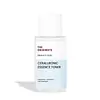What's inside
What's inside
 Key Ingredients
Key Ingredients

 Benefits
Benefits

 Concerns
Concerns

 Ingredients Side-by-side
Ingredients Side-by-side

Water
Skin ConditioningButylene Glycol
HumectantGlycerin
HumectantGlycereth-26
HumectantErythritol
Humectant1,2-Hexanediol
Skin ConditioningHydroxyacetophenone
AntioxidantAcrylates/C10-30 Alkyl Acrylate Crosspolymer
Emulsion StabilisingHydroxyethylcellulose
Emulsion StabilisingTriethanolamine
BufferingDisodium EDTA
PEG-40 Hydrogenated Castor Oil
EmulsifyingStephania Tetrandra Root Extract
Skin ConditioningSodium Hyaluronate
HumectantBeta-Glucan
Skin ConditioningPropylene Glycol
HumectantBisabolol
MaskingHouttuynia Cordata Extract
Skin ConditioningCaprylic/Capric Triglyceride
MaskingHydrogenated Lecithin
EmulsifyingHexylene Glycol
EmulsifyingStearic Acid
CleansingCholesterol
EmollientZingiber Officinale Root Extract
MaskingCeramide NP
Skin ConditioningWater, Butylene Glycol, Glycerin, Glycereth-26, Erythritol, 1,2-Hexanediol, Hydroxyacetophenone, Acrylates/C10-30 Alkyl Acrylate Crosspolymer, Hydroxyethylcellulose, Triethanolamine, Disodium EDTA, PEG-40 Hydrogenated Castor Oil, Stephania Tetrandra Root Extract, Sodium Hyaluronate, Beta-Glucan, Propylene Glycol, Bisabolol, Houttuynia Cordata Extract, Caprylic/Capric Triglyceride, Hydrogenated Lecithin, Hexylene Glycol, Stearic Acid, Cholesterol, Zingiber Officinale Root Extract, Ceramide NP
Water
Skin ConditioningButylene Glycol
HumectantGlycerin
HumectantCarbomer
Emulsion StabilisingRosmarinus Officinalis Water
MaskingCetrimonium Chloride
AntimicrobialNiacinamide
SmoothingPhenoxyethanol
PreservativeBromelain
Skin ConditioningMorus Nigra Fruit Extract
Skin ConditioningGlycolic Acid
BufferingGlycyrrhiza Uralensis Root Extract
Skin ConditioningPortulaca Oleracea Flower/Leaf/Stem Extract
AntioxidantPaeonia Suffruticosa Extract
Skin ConditioningPaeonia Lactiflora Extract
AstringentEthylhexylglycerin
Skin ConditioningSalix Alba Bark Extract
AstringentCentella Asiatica Extract
CleansingPropanediol
SolventCamellia Sinensis Extract
Antioxidant1,2-Hexanediol
Skin ConditioningGlutathione
Saccharum Officinarum Extract
MoisturisingAcer Saccharum Extract
Skin ConditioningCaprylhydroxamic Acid
Calendula Officinalis Flower Extract
MaskingHouttuynia Cordata Extract
Skin ConditioningCI 77007
Cosmetic ColorantHydroxyacetophenone
AntioxidantPotassium Sorbate
PreservativeSodium Benzoate
MaskingBletilla Striata Root Extract
Skin ConditioningAmpelopsis Japonica Root Extract
Skin ConditioningTribulus Terrestris Root Extract
Skin ConditioningPaeonia Lactiflora Root Extract
Skin ConditioningRhus Glabra Bark/Berry/Root Extract
AntiseborrhoeicPoria Cocos Extract
Skin ConditioningAtractylodes Macrocephala Root Extract
Skin ConditioningWater, Butylene Glycol, Glycerin, Carbomer, Rosmarinus Officinalis Water, Cetrimonium Chloride, Niacinamide, Phenoxyethanol, Bromelain, Morus Nigra Fruit Extract, Glycolic Acid, Glycyrrhiza Uralensis Root Extract, Portulaca Oleracea Flower/Leaf/Stem Extract, Paeonia Suffruticosa Extract, Paeonia Lactiflora Extract, Ethylhexylglycerin, Salix Alba Bark Extract, Centella Asiatica Extract, Propanediol, Camellia Sinensis Extract, 1,2-Hexanediol, Glutathione, Saccharum Officinarum Extract, Acer Saccharum Extract, Caprylhydroxamic Acid, Calendula Officinalis Flower Extract, Houttuynia Cordata Extract, CI 77007, Hydroxyacetophenone, Potassium Sorbate, Sodium Benzoate, Bletilla Striata Root Extract, Ampelopsis Japonica Root Extract, Tribulus Terrestris Root Extract, Paeonia Lactiflora Root Extract, Rhus Glabra Bark/Berry/Root Extract, Poria Cocos Extract, Atractylodes Macrocephala Root Extract
Ingredients Explained
These ingredients are found in both products.
Ingredients higher up in an ingredient list are typically present in a larger amount.
1,2-Hexanediol is a synthetic liquid and another multi-functional powerhouse.
It is a:
- Humectant, drawing moisture into the skin
- Emollient, helping to soften skin
- Solvent, dispersing and stabilizing formulas
- Preservative booster, enhancing the antimicrobial activity of other preservatives
Butylene Glycol (or BG) is used within cosmetic products for a few different reasons:
Overall, Butylene Glycol is a safe and well-rounded ingredient that works well with other ingredients.
Though this ingredient works well with most skin types, some people with sensitive skin may experience a reaction such as allergic rashes, closed comedones, or itchiness.
Learn more about Butylene GlycolGlycerin is already naturally found in your skin. It helps moisturize and protect your skin.
A study from 2016 found glycerin to be more effective as a humectant than AHAs and hyaluronic acid.
As a humectant, it helps the skin stay hydrated by pulling moisture to your skin. The low molecular weight of glycerin allows it to pull moisture into the deeper layers of your skin.
Hydrated skin improves your skin barrier; Your skin barrier helps protect against irritants and bacteria.
Glycerin has also been found to have antimicrobial and antiviral properties. Due to these properties, glycerin is often used in wound and burn treatments.
In cosmetics, glycerin is usually derived from plants such as soybean or palm. However, it can also be sourced from animals, such as tallow or animal fat.
This ingredient is organic, colorless, odorless, and non-toxic.
Glycerin is the name for this ingredient in American English. British English uses Glycerol/Glycerine.
Learn more about GlycerinHouttuynia Cordata Extract is more commonly known as Heart Leaf, Fish Mint, or Chameleon plant.
The components found in Heart Leaf give it antioxidant, hydrating, antimicrobial, and anti-inflammatory properties.
Heart Leaf is rich in flavonoids such as quercetin, apigenin, and more. It also contains polysaccharides, the most common type of carbs in food.
Flavonoids have been shown to be effective antioxidants. They help neutralize free-radical molecules. Free-radical molecules are unstable molecules that may damage our skin cells and DNA. The flavonoids in Heart Leaf also help soothe the skin.
Polysaccharides are naturally found in our skin. They play a role in hydrating and repairing the top layer of skin. The polysaccharides in Heart Leaf help moisturize our skin.
Studies show decanoyl acetaldehyde, a component of Heart Leaf oil, is effective at killing bacteria.
The name 'Fish Mint' comes from the herb's natural fishy smell. Is is native to southeast Asia and used throughout the continent for traditional cooking and medicine.
Learn more about Houttuynia Cordata ExtractHydroxyacetophenone is antioxidant with skin conditioning and soothing properties. It also boosts the efficiency of preservatives.
This ingredient is not irritating or sensitizing.
Water. It's the most common cosmetic ingredient of all. You'll usually see it at the top of ingredient lists, meaning that it makes up the largest part of the product.
So why is it so popular? Water most often acts as a solvent - this means that it helps dissolve other ingredients into the formulation.
You'll also recognize water as that liquid we all need to stay alive. If you see this, drink a glass of water. Stay hydrated!
Learn more about Water